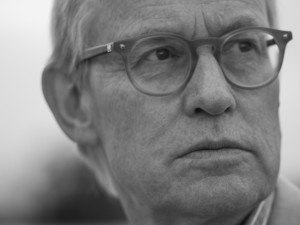19 April 2018
Macron on BFM/RMC
“Don’t you have a puerile sense of omnipotence?”
By Richard Pooley

Imagine Theresa May asking to be interviewed for two hours by John Humphries and Jeremy Paxman on a Sunday evening on both television and radio. I can’t think of any British political leader, current or past, making such a request. Not even a smooth-talking Tony Blair or a battling Margaret Thatcher. Yet that is what President Emmanuel Macron of France demanded should happen last Sunday night. Demander in French means ask, of course, but I am using it in its English meaning. It felt like an order. And it was not one the French media were going to refuse. Paxman is no longer sneering at quaking politicians on Newsnight but his style of interviewing is closest to that of Edwy Plenel, one of the men tussling with Macron on Sunday. Plenel is a 65-year old ex-Le Monde reporter and editor who set up Mediapart, an online investigative website. The Humphries equivalent was Jean-Jacques Bourdin, who I have written about before in Shaw Sheet. I listen to his 08.35-08.55 interview with a leading politician or intellectual (seldom a businessperson) most mornings. It was Marine Le Pen yesterday. Bourdin Direct is on both BFM television and RMC radio from 06.00 to 09.00, and on radio alone until 10.00. Some nine million French people tune into the programme at some stage during those four hours. More emollient than Plenel, Bourdin can still get through the most seasoned interviewee’s defences, especially with his feared “un dernier question” asked at 08.54. As Le Point described them on Monday, Plenel and Bourdin are “deux pitbulls de l’interview.”
So, why did Macron want to be interviewed by these two and for so long? Because he loves an aggressive debate and believes the French love it as well. He had no new policies to tell us about on Sunday. He was on a mission to explain and justify all the ones we already know about. I doubt he expected to change any minds. Not for him the angry tweets of Donald Trump or the hours-long, artfully-managed chats with the Russian people held by Vladimir Putin. Macron remains silent for weeks and then emerges to deliver a speech, such as the bout of inspiring oratory delivered to the European Parliament in Strasbourg on Tuesday, or to take part in an interview or two. He has been much mocked by French and foreign commentators for his self-styled “Jupiterian” approach to the presidency: quiet and aloof, thinking deeply on the mountain-top and then occasionally coming down to let us know where those thoughts will take us next. Many of the same commentators have predicted that he won’t be able to keep it up, that he will have to get his hands dirty negotiating with whoever are the latest to protest at his reforms, be they striking railway workers, civil servants or airline pilots. But there is no sign of him changing. He leaves it to his Prime Minister, Edouard Philippe, and his other ministers to do the haggling for him, confident that they will be able to do so successfully because his governing party, République En Marche, has an overwhelming majority in the National Assembly and still supports his determination to change the status quo in France. Moreover, Macron is working with the grain of French culture and its hierarchical nature, something else which loyal readers will recall I have commented on. The French may squirm at the idea of having a god for president but as long as he is prepared to debate from time to time corps à corps with some journalistic attack dogs, they don’t mind too much if he is otherwise distant and haughty. Indeed, I suspect, many admire him for it.
So, what did Plenel and Bourdin throw at him and how did he respond? I expected them to concentrate on two subjects: the French contribution to the attack on Assad’s chemical weapons research facilities in Syria, and the railway workers strike. The first got plenty of air time. But I sensed that the journalists were personally in support of Macron’s decision to join with the USA and the UK in attacking Syria and found it hard to argue that he should have got the National Assembly’s backing first. The regular two-day strike by SNCF’s cheminots, due to go on for another two months at least, got relatively little specific attention in the interview. It has been a huge headache for the 4.5 million people who travel by train each working day. Yet a third of those interviewed by pollsters continue to support the strike. “They have to protect what they have,” was the view of one traveller who waited for seven hours at the Gare du Nord to catch a train on the first day of the strike. Even so a recent Ifop poll had 61% of respondents saying they wanted Macron to push through with his reform of French railways. And each two-day stoppage (chiefly by train drivers) is proving slightly less disruptive than the one before: a third of TGVs were running during yesterday’s (and today’s) strike compared to one in eight during the first one. Macron is winning and he knows it: “I will go to the end of these reforms… not to do so would be hypocrisy.” When Plenel accused Macron of betraying his promise a year ago to bring France together and asked if his political movement should instead be called “En Force”, Macron in turn accused Plenel of being biased: “Is that a question or a speech for the defence [of the strikers]? I contest whether your question is objective… There is legitimate anger at the current reforms… But one does not unite the country by ceding to the tyranny of certain minorities.”
As time went on the language became angrier and more personal. After one particularly haughty ticking off from Macron, a clearly furious Plenel said “You are not a teacher and we are not your pupils.” To which Macron replied “You are not pupils, but when things are said which are not correct, I have to say so.”
What the journalists were keenest to question Macron on was his tax and labour reforms and the label which has appeared to have stuck to him of being “the President of the rich.” He was asked about his rich “friends”, Bernard Arnaud, owner of LVMH, and François Pinault, head of the Kering Group, who, the journalists implied, had benefited from his recent tax changes. “I don’t have friends,” Macron responded and then added “You are not judges; you are intervewers. I’m not here to judge whoever it might be.” He insisted that what Plenel and Bourdin were accusing him of – allowing tax evasion by the rich – was in fact tax avoidance and hence “not against the law.” Plenel agreed but said it was still morally reprehensible, denying money to hospitals and schools. Macron thereupon reminded Plenel that Mediapart had been subject to a “tax readjustment” in 2014. “That’s unworthy of you,” replied a wounded Plenel.
And so it went on. For 40 minutes more than the allotted two hours. British broadcasters would have had a fit but not BFM TV/RMC. 3.24 million people watched it on television and millions more, no doubt, listened on the radio.
There was a lot of analysis of it by the media on Monday. One of the matters most talked about was why Plenel and Bourdin had only once, at the start, referred to Macron as “Monsieur le Président”. At all other times they used “Emmanuel Macron”. Never mind the heated exchanges and the angry words used by both sides, was this not showing lack of respect? Bourdin explained that he always used an interviewee’s first name and surname when interviewing, be they president or peasant.
Plenel landed more punches than Bourdin but it was the latter who asked the best question (and, yes, it was almost his last one): “N’êtes-vous pas dans une illusion puerile de toute puissance?” Macron’s reply? “I don’t believe in total power; I believe in full and complete democracy.”


